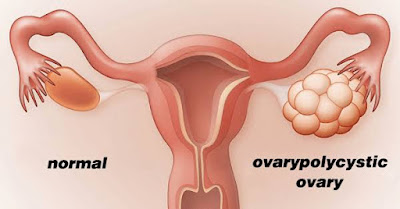Symptoms of PCOS
Health series #5
Symptoms of PCOS
PCOS (Polycystic Ovary Syndrome) is a hormonal disorder that affects women of reproductive age. The symptoms of PCOS can vary from person to person, and some women may experience all or just a few of the symptoms. The most common symptoms of PCOS are:
Irregular periods
Women with PCOS may have infrequent or irregular periods, or may not have periods at all. This is due to the hormonal imbalances in the body.
Excess androgen
Androgens are male hormones that are also present in women in smaller amounts. In women with PCOS, the androgen levels are elevated, which can cause symptoms such as acne, excessive hair growth (hirsutism) on the face, chest, back, and stomach, and male-pattern baldness.
Polycystic ovaries
The name "polycystic ovary" refers to the appearance of the ovaries in women with PCOS. The ovaries may be enlarged and contain small cysts, which are follicles that have failed to release an egg during ovulation.
Weight gain and difficulty losing weight
Women with PCOS may find it difficult to lose weight or may gain weight easily, especially around the waist.
Insulin resistance
Insulin resistance is a condition in which the body is unable to use insulin effectively, which can lead to high blood sugar levels. Women with PCOS may be insulin resistant, which can increase their risk of developing diabetes.
Mood changes
Women with PCOS may experience mood swings, anxiety, and depression.
It's important to note that not all women with PCOS will have all of these symptoms. Some women may only have one or two of these symptoms, while others may have several. If you suspect that you may have PCOS, it's important to talk to your doctor. They can perform tests to diagnose PCOS and provide treatment options to manage the symptoms.
Medications
Hormonal birth control to regulate menstrual cycles and reduce androgen levels, anti-androgen medications to block the effects of male hormones, and insulin-sensitizing drugs to lower insulin levels.
Surgery
Ovarian drilling to reduce androgen levels and improve fertility.
Lifestyle changes
Exercise regularly, eat a balanced and healthy diet, maintain a healthy weight, and avoid smoking.
PCOS (Polycystic Ovary Syndrome) is a hormonal disorder that can be managed through a combination of lifestyle changes and medication.Treatment is personalized and should be based on the individual's symptoms and health history. Consult with a healthcare provider to determine the best treatment plan.




.jpeg)

Comments
Post a Comment